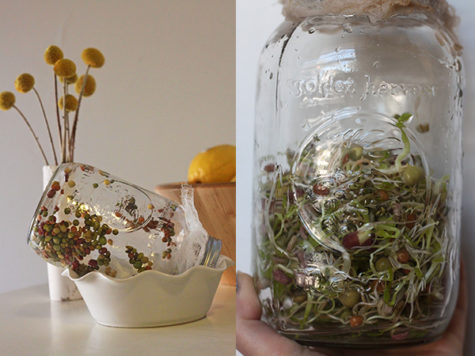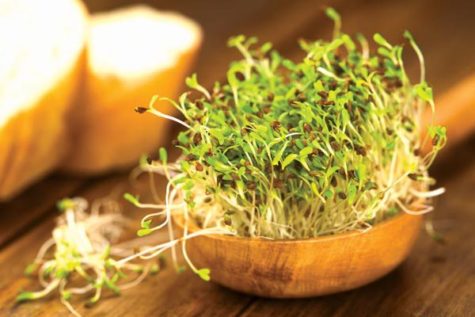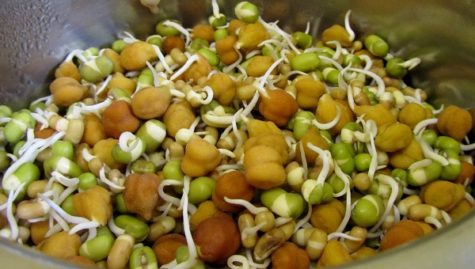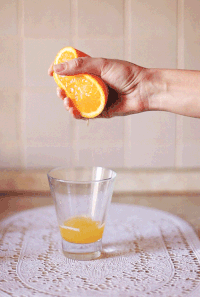Sprouts
How To Make Sprouts
Use one part seed to at least three parts water. Soak in a wide-mouth jar. All measurements below yield one quart of ready sprouts. Half-gallon or larger jars are more convenient.
- 1 cup aduki beans – soak 12 hours – 3 to 5 days to sprout
- 2 tablespoons alfalfa seed – soak 6 hours – takes 5 to 6 days to sprout
- 2 tablespoons red clover seed – soak 6 hours – takes 5 to 6 days to sprout
- 1/2 cup fenugreek – soak 8 hours – 3 days to sprout
- 1 cup garbanzo beans – soak 12 hours – 3 to 5 days to sprout
- 1 cup legumes – soak 12 hours – 3 to 5 days to sprout
- 1/2 cup lentils – soak 8 hours – 3 days to sprout
- 1/2 cup mung beans – soak 8 hours – 3 to 5 days to sprout
- 1/4 cup mustard seed – soak 6 hours – takes 5 to 6 days to sprout
- 1/4 cup radish seed – soak 6 hours – takes 5 to 6 days to sprout
- 1 cup rye – soak 12 hours – 3 days to sprout
- 1 cup soy beans – soak 12 hours – 3 to 5 days to sprout
- 2 cups sunflower seeds – soak 12 hours – 2 days to sprout
- 1 cup wheat – soak 12 hours – 3 days to sprout
Instructions:
Cover the mouth of the jar with a plastic or stainless steel sprouting screen or cheesecloth, which is tied on or secured with a rubber band (sprouting jars, bags, and automatic sprouting machines are also available).
After soaking seeds for the prescribed amount of time, drain well, and keep in a warm (65 degree F) dark place. They can be covered with a cloth or bag. Sprouting time increases with more light and cooler conditions.
Rinse twice a day, ideally morning and evening. An exception is soy, which may rot if not rinsed four times daily. Keep jar tilted mouth down for better drainage. A dish drainer works well for this. Thorough rinsing and complete draining improve sprout flavor.
After three days place alfalfa, red clover, radish, and mustard sprouts in a cool place with indirect sunlight to induce chlorophyll. Continue rinsing twice daily until sprouts are ready.
Radish and mustard seed sprouts exhibit biting pungency, which adds a delightful zesty quality when mixed with other sprouts or in various dishes.
During the sprouting process, the hulls on certain seeds slough off. It is important to remove hulls from alfalfa and radish sprouts since these easily rot. Hulls from mung, aduki, and fenugreek are often removed for a lighter-tasting quality, although they can be eaten and provide fiber.
To remove the loose hulls from sprouts, place them in a large bowl of water and agitate them, further loosening and brushing them aside. Gently reach under the sprouts and lift them out of the water, without disturbing the sunken hulls, which can then be discarded.
Drain sprouts well. If refrigerated, they keep up to one week in a plastic bag or covered glass jar.
Note:
Alfalfa may not sprout in polluted tap water. Use distilled or spring water or sprout with other seeds (mung, lentil, fenugreek) in the same jar. You will have a delicious salad. Save all rinse water for cooking, watering plants, or to give your animals.
From: Healing With Whole Foods
Alfalfa Sprouts
Alfalfa is America’s favorite sprout and is considered more nutritionally concentrated than other sprouts, primarily because of its rich mineralization. The tiny alfalfa seed produces a root that can reach 100 feed into the earth, where it has access to minerals and trace elements untouched by other plants.
Alfalfa follows the doctrine of signatures: its ability to produce exceptional roots benefits our “roots,” which are often identified physiologically as our intestines and kidney/bladder functions.
Arabs were the first to discover alfalfa and found it a highly strengthening food, both for themselves and their race horses. Because of its attributes, they named it al-fal-fa, which means “father of all foods.”
From: Healing With Whole Foods
About Sprouts
Sprouts represent the point of greatest vitality in the life cycle of a plant. One clearly experiences this vitality when eating sprouts consistently. During sprouting, vitamin and enzyme content increases dramatically. At the same time starch is converted into simple sugars, protein is turned into amino acids and peptones, and crude fat is broken down into free fatty acids. Hence, the sprouting process predigests the nutrients of the seed, making it easier to assimilate and metabolize. This explains why grains and legumes, many of which are common allergens, often do not cause allergies when sprouted.
Nevertheless, the sprouting process increases the cooling attributes of the seed, which can over-cool the cold person and weaken digestion in those with low “digestive fire.” Generally if one is frail, feels cold often and/or tends toward loose stools, then sprouts must be eaten sparingly. Cooking makes sprouts more appropriate for these individuals. On the other hand, the excessive person (robust body and personality, thick tongue coating, ruddy complexion, strong radial pulse and voice) will benefit from abundant raw or lightly cooked sprouts.
In Chinese medicine, sprouts are a specific remedy for cases of stagnant liver qi (with signs such as swellings and lumps, mental depression, frustration, swollen abdomen and chest, purple-tinged or dark tongue, and/or greenish complexion).
During cold seasons, sprouts act as an excellent source of fresh vegetables. Cooking them at this time of the year balances their cooling nature. In fact, in China where sprouts have thousands of years of traditional use, they are routinely cooked. Raw sprouts have been desirable in the West because they more efficiently reduce the massive excesses occurring among the general population.
For better digestion for every type of person, large grain and legume sprouts such as aduki, lentil, corn, green peas, soy, garbanzo, and wheat can be lightly steamed and are still vital and energizing. They need to be simmered, sauteed, or steamed longer fore people who are cold or deficient.
The growth characteristics of sprouts are most appropriate for attuning one to the energetic upsurges of spring and summer.
From: Healing With Whole Foods





